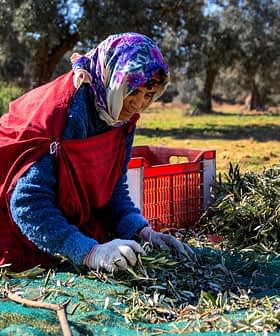In La Mancha, 788 'Families' United in Quality
Forty years ago, a few dozen farmers in La Mancha started the cooperative of Valedepeñas. Today, Colival's 788 associates are looking to the future.
 Consoli Molero
Consoli MoleroA rain of green olives fall to an inverted umbrella unfolded at the base of an olive tree. The tree is shaken once, or twice until no more fruits drop.
Then the harvesting machine moves to the next tree and the next. It’s a fast mechanical job.
We are at Sierra Prieta’s estate, which, with some 2,000 hectares is one of the largest associates of the Valedepeñas cooperative of olive oil producers (Colival).
Today they are collecting the early harvest of the Hojiblanca cultivar. Later in the day, they will bring their olives to the cooperative, where they will be immediately milled.
“Valdepeñas has traditionally been a wine land. Nowadays it is also becoming an olive oil land,” Consoli Molero, the manager of Colival tells Olive Oil Times.
Molero has been responsible for Colival’s quality and production for the last 20 years. Her father used to be the master miller of the cooperative.
“I studied computer programming and business. I’ve always lived in the environment of the oil mill, but I never thought I would end up working at the same mill where my dad made oil for so many years,” she says while we walk through Sierra Prieta’s olive grove.
“I’m a numbers person, but curiosity has made me specialize in oil production and tasting. Also because I like it,” she adds.
Valdepeñas’ olive oil cooperative was founded in 1979 by a few dozens of farmers. Today, it counts 788 associates.
Molero points out that a cooperative should be managed in the same way as a private company.
“The only difference is that in private business, profits go to just one person, while in a cooperative, profits go to all its associates — 788 members who, at the end of the day, are 788 families,” she says.
Colival’s Valdenvero won a Gold Award for its Hojiblanca at the 2019 NYIOOC World Olive Oil Competition.
The vast flatlands of La Mancha, where Valdepeñas is set, lie North of Jaén’s sea of olive trees, beyond the natural frontier of Sierra Morena’s mountain range.
This landscape is universally known for being the homeland of Don Quixote, the most famous character of Spanish literature, although foodies will also link it to Manchego cheese and saffron.
But unlike its Southern neighbor, Andalusia — Spain’s largest olive oil-producing region — olive groves here share their prominence with huge fields of wheat, barley and vineyards.
Still, La Mancha region — mainly the provinces of Ciudad Real and Toledo — is the second-largest oil producer in Spain. Last year’s record harvest in La Mancha reached around 180,000 tons, far behind Andalusia’s 1.3 million.
Colival is the largest producer in Ciudad Real.
“In our region, we are increasing the number of hectares and production. There are a lot of new olive groves, some of them are intensive ones and super-intensive ones. The farmers have also bet on newly planted cultivars such as Arbosana and Hojiblanca,” Molero explains.
However, it is the Cornicabra — which literally means “horn of goat” due to is long and pointy shape — which is the main local cultivar and an icon of the oil from La Mancha.
“Cornicabra was planted many years ago in the area of Toledo and Ciudad Real. This variety has given us a name. On top of that, it’s a balanced and powerful oil which serves as a base for other lesser quality oils,” Molero tells us.
Colival’s strategy consists of keeping its Cornicabra production while diversifying with other cultivars. They also produce two lines of oils in terms of quality: a “normal” extra virgin olive oil, which represents the majority of their production, and their Vandelvero top-of-the-line brand.
When asked about the challenges of producing high-quality olive oil in the context of a large cooperative, Molero points out that the “associates are already mentally prepared that, if they want to produce quality, they have to do as the cooperative says.”
Reaching this point required a certain amount of “planning” though.
“The first year that we started producing our top of the line oil (…), we had an associate who owned his own means of harvest. He had harvesting machines, umbrellas and three cultivars. So I talked to that member and I explained to him what I wanted for the cooperative. He supported me straight away and we harvested the three cultivars from his fields,” Molero recalls.
“The second year, it was easy. All the members said: ‘I want to make that award-winning oil that you make.’ So the second year, the associates came to me.”
As the sun sets in Valdepeñas, trailers full of olives make their way from the olive groves to the premises of the cooperative.
After separating the fruit from the leaves, the olives run through conveyor belts to the mill. The dense aroma of freshly pressed olive juice fills the air.
Molero grabs a small glass and tastes the new oil.
“It’s worthy when the stream of the new oil flows… when the mill is at an exceptional temperature, the oil is at 24 degrees and you taste it and it has all the aromas. That is gratifying,” she says.
“And the awards. The awards we’ve been granted are due to the hard work of the cooperative and all the team.”








